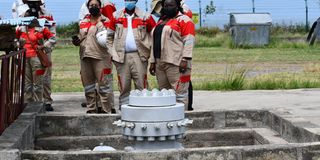Prime
How will oil and gas impact insurance?

The oil and gas sector has many risks and will present insurers with business. PHOTO | COURTESY
What you need to know:
- Whereas insurance penetration has stagnated at under 1 percent for many years, the prospect of oil and gas, which is expected to come with 60,000 jobs, will boost the sector in so many ways.
Insurance is one of the sectors with the lowest rate of penetration in Uganda.
For years, it has stagnated at less than 1 percent. However, the prospect of oil and gas presents new optimism in the sector whose growth, like many others, has been dampened by Covid-19.
Currently, oil is at development stage with investments estimated at $10b.
More than 60,000 jobs are expected to be created in the oil and gas sector, of which 15,000 will be directly in the oil and gas, while the rest will come through contracts.
This spells an economic boom and insurance will be one of the biggest beneficiaries.
Joseph Almedia, the Liberty Insurance managing director, is optimistic and predicts a spike “in premiums both in the medium and long term because employers will be looking at how best they can protect their staff”.
At least more than 200 companies are expected to set up shop in Uganda and will definitely take up mandatory and optional insurance services, among which include healthcare insurance.
In Uganda, health insurance has been growing steadily and with more than 60,000 jobs in the pipeline, there will be no better beneficiary than health insurers.
Oil and gas has many risks, especially for those directly involved. Therefore, insurance firms will be required to innovate in order to come up with packages that are both friendly and useful to consumers.
For instance, according to Almedia Liberty Insurance has already introduced the group income replacement policy, which is essential in the event that one is injured and can nolonger carry on with their work.
The cover, he says, ensures that at least 50 percent of the person’s salary, who has been injured, is remitted even when they are out of the job.
Almeida says the insurance sector, will this year alone, attract around Shs20b in new premiums health and life cover while more than Shs40b is expected from workerman’s compensation.
More players are expected to put out oil and gas related insurance innovations because of the specialised nature of the sector.
The new demands have also seen revisions by sector regulator – Insurance Regulatory Authority – that now require insurance firms to have capital adequacy ratios of about 200 percent as capital requirement.
However, with firms recovering from Covid 19 related effects, where health and life covers have filed so much in claims, the capital adequacy ratio may come as a tall order.
Almeda notes: “The effect of Covid-19 was big on all insurance firms dealing in health and life covers because we all paid up some substantial claims”.
However, notes that a number of insurers overcame the challenges to return profits during one of the most challenging periods.
Therefore, the prospects of oil, he says, are expected to push up economic growth, which will be key in boosting individual and the larger economy.
Perspective from regulator
Whereas, many companies had prospected on various fronts, the Insurance Regulatory Authority has been conducting consultations.
In its findings, conducted in consultation with the Petroleum Authority of Uganda, it had found that the oil and gas sector is a very specialised and complex sector, which denotes that it would be risky for any company to go it alone in venture, especially where it has less expertise.
Sande Protazio, the IRA director planning, research and market development, says: “Whereas we are cognizant of the opportunities we are also aware that it can cause serious disruption if something happens.”
Therefore, he says, companies that are not able, should not risk to stretch themselve but should seek partnerships where they see need.
Beyond just offering advice, IRA has also brought on board international consultants, among them Total Risk Solution, to guide the sector on issues of underwriting, absorption and how much they should absorb visa-vie how much they should let go in terms of reassurance.
According to Sande, both medium and long term estimates have already been affected by delays in the final investment decisions.
However, the industry still expects a flow of Shs100b per annum in the short term, which is expected to grow at least by more than 25 percent annually.
“The reason why our estimates are low is because we wnat to allow the sector to develop capacity – thereafter they can allow in more business,” Sande says.
For now, he says, what IRA is doing is to develop market capacity as well as ensure that growth is universal and does not grow one company at the expense of the other.
“You know this is a business that has potential to burn our fingers if the appetite is not regulated. One claim can cause substantive damage to the sector” he says.




